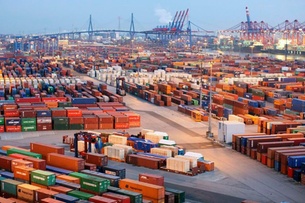Globalisation is not just an economic process but also has social, political and cultural aspects. (Keystone) Switzerland was the most globalised country in the world, according to a 2016 survey by the KOF Swiss Economic Institute. It moved up one place to the top compared with the previous year. The Netherlands, Belgium. Sweden and Britain followed in the next places. The United States are in 23rd place and the Comoros, Afghanistan and Guinea-Bissau are bottom of the 195-country rankingexternal link, which was published on Thursday. The experts at Zurich’s Federal Institute of Technology say smaller countries tend to be place higher up in this ranking than larger countries. This is the result of their greater degree
Topics:
Swissinfo considers the following as important: 3) Swiss Markets and News, Business, Featured, newsletter
This could be interesting, too:
Nachrichten Ticker - www.finanzen.ch writes Die Performance der Kryptowährungen in KW 9: Das hat sich bei Bitcoin, Ether & Co. getan
Nachrichten Ticker - www.finanzen.ch writes Wer verbirgt sich hinter der Ethereum-Technologie?
Martin Hartmann writes Eine Analyse nach den Lehren von Milton Friedman
Marc Chandler writes March 2025 Monthly

Globalisation is not just an economic process but also has social, political and cultural aspects. (Keystone)
Switzerland was the most globalised country in the world, according to a 2016 survey by the KOF Swiss Economic Institute. It moved up one place to the top compared with the previous year.
The Netherlands, Belgium. Sweden and Britain followed in the next places. The United States are in 23rd place and the Comoros, Afghanistan and Guinea-Bissau are bottom of the 195-country rankingexternal link, which was published on Thursday.
The experts at Zurich’s Federal Institute of Technology say smaller countries tend to be place higher up in this ranking than larger countries.
This is the result of their greater degree of interdependence, for example with neighbouring countries, leaving the largest national economies around the world in the mid-range.
The KOF Globalisation Index measures the economic, social and political dimensions of globalisation between 1970 and 2016. It is used to monitor changes in the level of globalisation of different countries over a long period of time.
“The level of worldwide globalisation increased rapidly between 1990 and 2007. But the financial crisis and the subsequent recession have slowed down its development,” the Swiss Economic Institute says.
In 2016, the level of globalisation rose only slightly, and economic globalisation stagnated. The authors of the report add that although financial globalisation continued to progress, trade integration was negative whereas political and social globalisation were on the increase.
swissinfo.ch/ugTags: Business,Featured,newsletter
